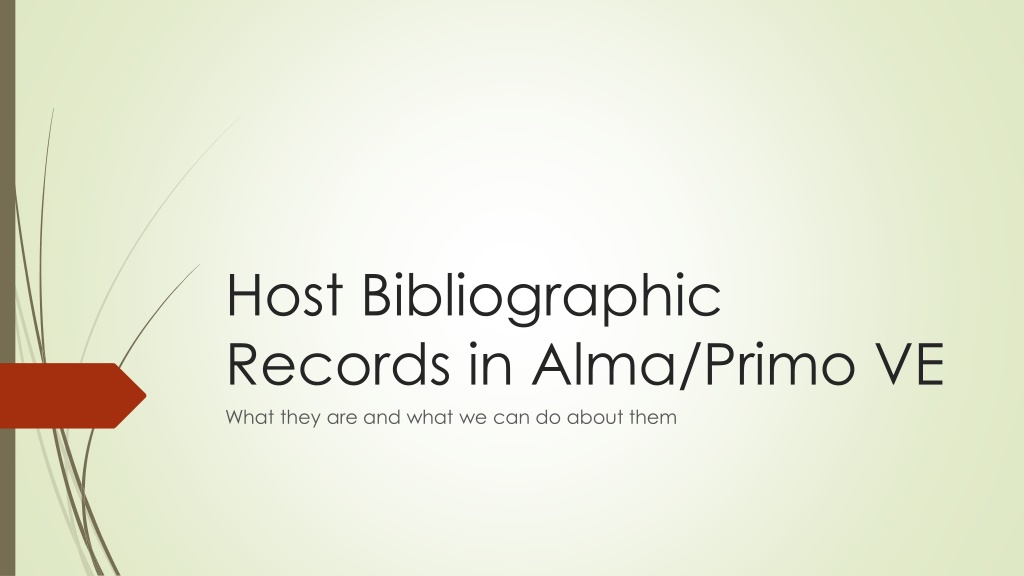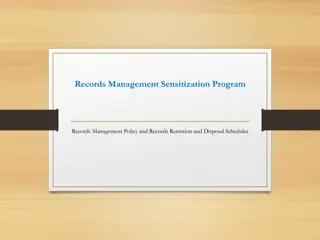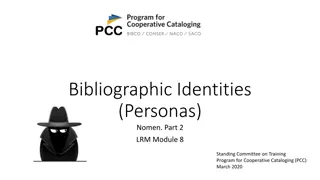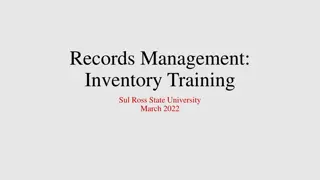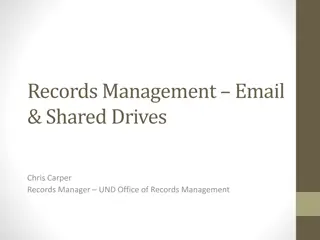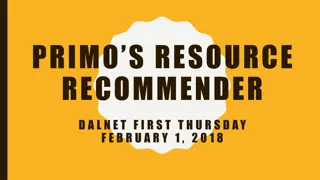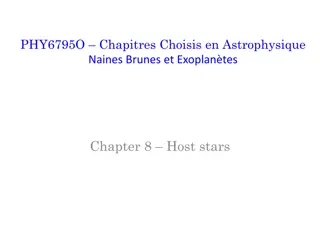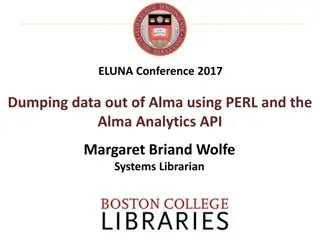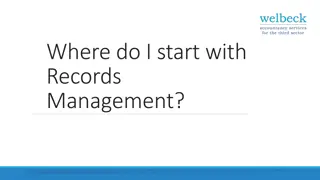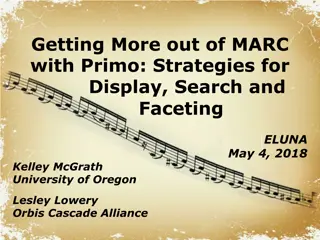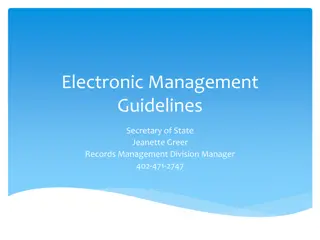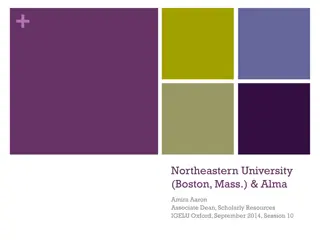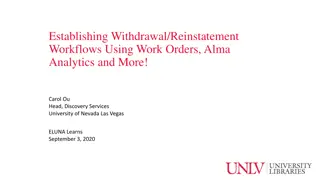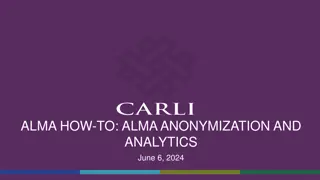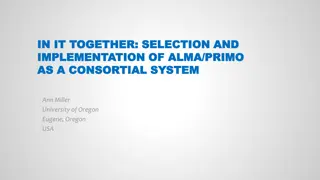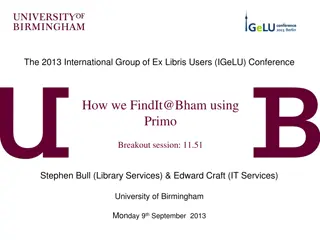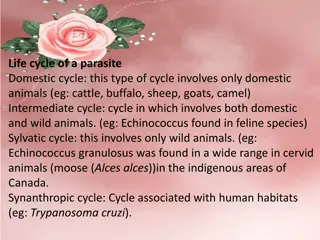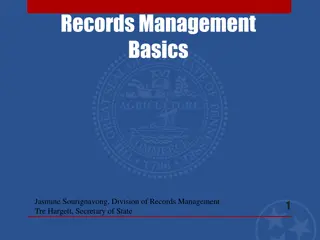Understanding Host Bibliographic Records in Alma/Primo VE
Explore the concept of Host Bibliographic Records in the Alma/Primo VE system, which address the issue of linking single items to multiple bibliographic records. Learn how host bibs work, their creation during data migration, implications for library services, and the various types of host bibs used. Gain insights into the analyzed series, serial title changes, multiple format issues, and true bound-with scenarios.
Download Presentation

Please find below an Image/Link to download the presentation.
The content on the website is provided AS IS for your information and personal use only. It may not be sold, licensed, or shared on other websites without obtaining consent from the author. Download presentation by click this link. If you encounter any issues during the download, it is possible that the publisher has removed the file from their server.
E N D
Presentation Transcript
Host Bibliographic Records in Alma/Primo VE What they are and what we can do about them
What Host Bibs Do Host bibs are Alma s solution to the problem of a single item being linked to multiple bibliographic records. This was a common record structure in Voyager, but is not directly supported in Alma. Alma s workaround is to create another bib record that contains references to each of the multiple bibs related to an item. This additional bib is the Host Bibliographic Record. Items are attached to the Host bib record. The real bibs that are related to the item do not have items attached. Special fields in the Host bib (MARC 774) relate the Host bib and the real bibs so that a search for any title on a real bib will also retrieve the Host and display appropriate items.
In the data migration process, Host bibs were created that look like this in a cataloger s view Field 245 is the title of the Host bib. The two 774 fields are the titles of the real bibs that are related to the item represented by the barcode at the end of the 245 field. The numbers in $$w of the 774 fields are the Alma system numbers (MMS IDs) for these bibs, and are what actually makes the linkages. Women & Politics is the bib for the entire series. The Equal Rights Amendment is the bib for one volume in that series.
Service Implications As you can see from the previous slide, there are a lot of these (25,547 at the moment). These titles convey no meaningful information to users. These titles will appear in notices that Alma may send to patrons regarding borrowed, returned, requested, or overdue materials. These titles will appear in the Loans section of My Library Card. These titles may also appear in other types of catalog search displays. These titles may also appear in resource sharing requests
There are several types of Host bibs The Analyzed Series Each Host bib typically has references to one serial bib and one monographic bib. The entire series will have as many Host bibs as there are members of the series. The Serial Title Change As serials change title, we have generally kept the volumes of all titles together on a single holding attached to all related bibs. Host bibs will have several serial bib references (774 fields), one for each current and former title. The Multiple Format Issue When we have had periodicals in both print and microform, we used separate bibs for each format and linked holdings together, so users would find both formats regardless of which bib was used to retrieve holdings. Alma creates a separate Host bib for each format. The True Bound-With These are separate bibliographic entities that have been combined into a single physical piece. An example is some volumes of U S Geological Survey Bulletin that have been bound together but do not have a serial bib tracing.
What to do? Stop making more Host bibs For most volumes in series, we can stop linking holdings to a separate serial bib. Series access is preserved though the series tracing on the monographic bib. Creating (and undoing) Host bibs is a complicated business in Alma. Edit existing Host bibs to make them meaningful Host bibs can be edited to replace the generic title with useful title information and can be enhanced in any other way desirable, as long as the 774 fields remain unchanged to preserve the Host bib s linking functions. Work where it matters There are 25,000+ of these. Editing all of them will take years of effort. Editing records of materials that are circulating will focus work where it will have the most impact. Working on series that are currently acquired is also a good strategy.
Stop Making More Host Bibs Choosing monographic bibs for ordering Cataloging is helping Acquisitions identify serials and standing orders that have been analyzed in the past. Cataloging will advise Acquisitions of a suitable monographic bib to use for ordering instead of using the serial bib as in the past. Call number Cataloging will identify the call number previously used for the series. Volume numbers will be appended to the end of the individual title s base call number for the series (DA20.C57 Ser.5 v.58 is an example). Cataloging will verify that the appropriate series tracing is present in the monographic bib s 8xx field. 830 _0 $$a Camden fifth series $$v v.58
Edit Existing Host Bibs to Make Them Meaningful Create a new 500 field Cut the Host bib title from 245 $$a and paste it to 500 $$a This preserves in a note field the information that may be useful to understand the origin and function of this bib. Copy the monographic title from one of the 774 fields to 245 $$a Save and release the record
Its Not Always That Simple Sometimes the titles in 774 fields are still too vague to be much use Add more data to make things clear In this example we added an abbreviation for the series and the number of this title s volume (found by viewing inventory) to distinguish it from several other volumes with the same Chamber music title. These titles do not need to be overly detailed. Remember, there is a full bib for this title in addition to this Host bib.
Its Still Not Always That Simple What if the titles in 774 are the same, or almost the same, and they re both serials? In this example, we viewed inventory and discovered that this Host only links to the Periodical Stacks location. So we added that to the title. Another Host bib will link to only Microfilm, and we will add that qualifier on its bib.
And More Complicated Yet Here is an example where there are many monographic bibs I cannot use any of the 774 titles to replace the Host bib title, because a user would probably not recognize titles other than the one they are reading.
And More Complicated Yet, pt.2 Viewing inventory, I discovered the call number QE75.B9 n. 1-11, and looking that up, I found it was a cumulation of issues of the U S Geological Survey Bulletin. I decided to use the series as my Host bib title replacement, with its enumeration:
Bound-Withs and LP Sound Recordings Over a half-century ago, when cataloging rules were different, it was common practice to make separate bibliographic records for each work on sound recordings. Below is a Host bib resulting from two bibs being created for a sound recording of Beethoven s fifth symphony on one side of an LP and Mozart s 40th symphony on the other.
Bound-Withs and LP Sound Recordings Because there is no comprehensive title for the recording, I think it would be best to modify the Host bib so that each of the 774 titles is included in the 245, separated by semicolons, like this.
Host bib appearing in resource sharing requests This record was created after data migration as the result of a resource sharing request for an article in a journal. The 100 and 245 fields indicate the author and title of the article. Field 773 indicates the title of the journal and the citation details. Since the journal was in a Host bib situation, the Host bib title was ingested into the request. If corrections had been made to the Host bib, the actual journal title would have appeared in 773.
Fixing Host bibs in resource sharing requests The correct title for field 773 can be found by searching the barcode as a keyword. The following Host bib would appear from this example. This Host bib can be edited by moving the present 245 field to 500 and replacing it with one of the 774 fields. The resource sharing request bib can be edited to change the title portion of the 773 field to one of the 774 fields from the Host bib.
Fixing Host bibs for resource sharing requests Here is the edited version of the example resource sharing request bib.
Working Where It Matters Circulating materials will generate notices to patrons. Editing Host bibs that are currently on loan will help give patrons meaningful information in these notices. We can periodically check to see if any Host bib items are currently checked out by going to Admin Manage Sets. Click the ellipsis at the right of the set called Host bib Item not in place, then select Results. Any such bibs will appear in a list and can be edited.
Working Where It Matters Another useful approach to the Host bib problem is to edit active series. When we receive a new volume in a series, we can check for Host bibs for the series and change them all. For example, here is an advanced query that will find all Host bibs for the series Recent Researches in American Music that are also not suppressed from discovery. We can then work with the set as a project, taking into account the individual characteristics and problems of the series.
Here is a Primo view of a partially edited series. You can see how the Host bibs will be replaced by more meaningful titles. This series is partially analyzed, so some volumes have individual titles and some have just the series title and volume number.
Questions, etc. Please direct questions to someone in Cataloging Services If you notice Host bibs that are of immediate concern, please report them to Cataloging Services and we will prioritize editing them.
